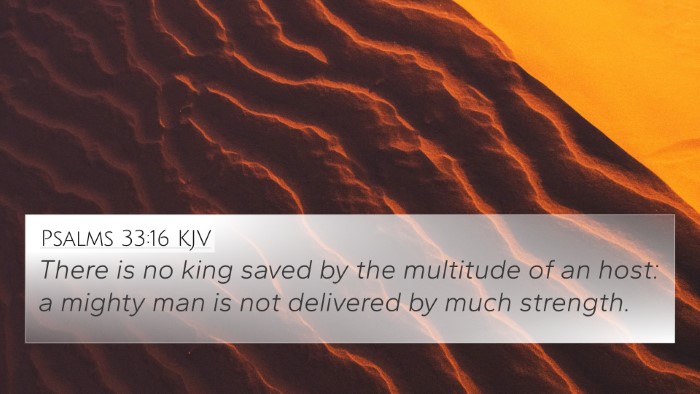Understanding Job 36:19
Verse: "Will your cry for help avail to keep you from distress?" (Job 36:19)
Overview
The verse Job 36:19 presents profound truths about human suffering, divine justice, and the limitations of man's efforts in the face of distress. It highlights the futility of relying solely on one's cries for help without recognizing the need for genuine understanding and submission to God's will.
Meaning and Interpretation
This verse, spoken by Elihu, serves as a reminder that in times of trouble, mere appeals to God are not enough if they do not stem from a place of true humility and acknowledgment of God's sovereignty.
Commentary Insights
-
Matthew Henry:
Henry emphasizes that Elihu underscores the importance of sincere repentance and reliance on God's grace rather than superficial actions. He argues that mere cries for help without faith and true understanding are ineffectual.
-
Albert Barnes:
Barnes notes that the question posed in this verse implies a rhetorical challenge. It highlights the inadequacy of human efforts when they are not aligned with God’s intentions, as they cannot prevent the consequences of our actions or alleviate genuine distress.
-
Adam Clarke:
Clarke interprets this verse as a profound inquiry into the nature of prayer and petitions before God. He explains that while God hears our cries, understanding and acceptance of His authority is crucial for true deliverance.
Cross-References for Job 36:19
This verse resonates with many other Scriptures that address themes of suffering, reliance on God, and the relationship between distress and divine assistance. Below are some Bible verses that are related:
- Psalms 34:17-18: "The righteous cry, and the Lord hears, and delivers them out of all their troubles."
- Psalms 50:15: "Call upon Me in the day of trouble; I will deliver you, and you shall glorify Me."
- Isaiah 41:10: "Fear not, for I am with you; be not dismayed, for I am your God."
- James 1:5: "If any of you lacks wisdom, let him ask of God, who gives to all liberally and without reproach."
- Matthew 7:7: "Ask, and it will be given to you; seek, and you will find; knock, and it will be opened to you."
- 1 Peter 5:7: "Casting all your anxieties on Him, because He cares for you."
- Romans 8:32: "He who did not spare his own Son but gave him up for us all, how will he not also, with him, graciously give us all things?"
- Psalms 91:15: "When he calls to me, I will answer him; I will be with him in trouble; I will rescue him and honor him."
- Proverbs 3:5-6: "Trust in the Lord with all your heart, and do not lean on your own understanding; in all your ways acknowledge him, and he will make straight your paths."
Key Takeaways
- The verse emphasizes the futility of relying solely on human efforts or cries for help without true alignment with God's purpose.
- It serves as a challenge to believers to seek genuine connection with God in times of trouble.
- Understanding the sovereignty and authority of God is fundamental for effective prayer and supplication.
Application and Reflection
As you meditate on Job 36:19, consider the following questions:
- How do your prayers reflect your understanding of God's authority in your life?
- In what ways can you ensure that your cries for help are sincere and rooted in faith?
- What steps can you take to deepen your relationship with God, especially during difficult times?
Thematic Connections and Cross-Referencing
Job 36:19 is a powerful reminder of the importance of aligning our prayers and cries for help with an understanding of God's will. It invites us to explore related themes across Scripture, such as:
- The nature of prayer: Understanding the depth and sincerity required in our communications with God.
- Human limitations: Recognizing our incapacity to solve every problem through human effort alone.
- Divine intervention: Trusting in God's ability to intervene in our circumstances for our ultimate good.
Conclusion
Job 36:19 serves as a reflective point for all believers, encouraging us to take a humble approach toward our distress, to seek God genuinely, and to acknowledge His sovereignty over our lives. By cross-referencing this verse with others, we can gain deeper insights into the consistent message of reliance on God's strength amid human vulnerability.












